Contrary to popular belief among betta fish owners, these pets are not omnivorous and cannot simply eat the food of other fish species. In fact, bettas are primarily carnivorous and require a diet rich in protein.
The dietary needs of bettas can vary. Some bettas, particularly those born in the wild, have voracious appetites and can consume a wide variety of foods. On the other hand, some bettas can be quite selective, rejecting certain foods presented to them.
To ensure your betta’s diet is balanced and beneficial to their health, reading our blog post that details the best food for betta fish. This post provides an overview of each option’s advantages and disadvantages, enabling you to make an informed decision based on the specific needs of your betta.
It’s also important to be aware of foods to avoid that can be harmful to betta fish’s health. All the information need to know is here.
What Do Betta Fish Eat?
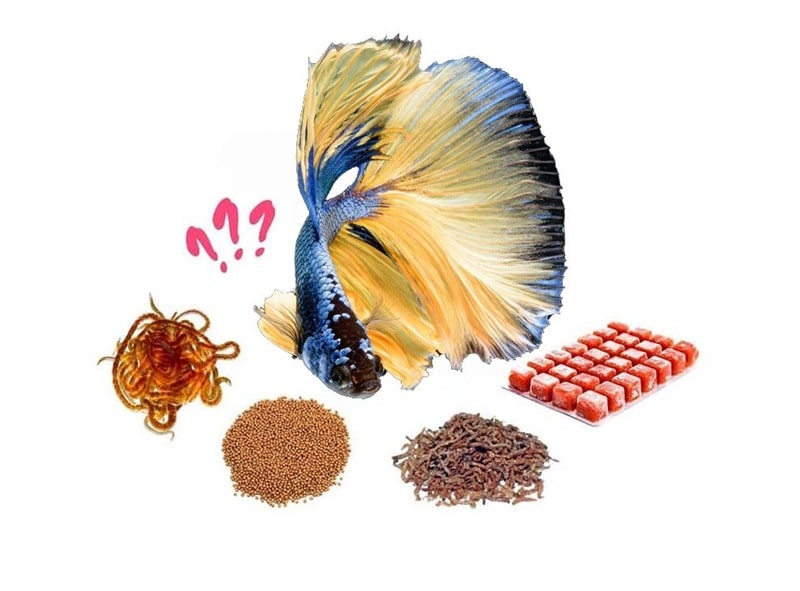
Just like us, Betta enjoy a good meal. In the wild, they love eating bugs. But at home, you can feed them different types of food to keep them happy and healthy as Blood Worms, Mysis Shrimp, Betta Flakes, Betta Pellets, Daphnia, Brine Shrimp, Tubifex Worms, and Mosquito Larvae…
- Dry Food: There are special pellets and flakes made just for Betta fish. They’re easy to find and good for everyday feeding.
- Live Food: Betta fish like hunting. You can give them tiny live foods like fruit flies, earthworms, or mosquito babies. It’s fun for them and natural.
- Frozen Food: If you don’t want live food, there are frozen options too. Things like frozen shrimp or worms can be a treat for your Betta.
Betta fish have a preference for freeze-dried treats like bloodworms, and they can also enjoy pellets as a staple part of their diet. Optimal betta food should align with these particular dietary preferences, avoiding excessive and hard-to-digest fillers.
5 Best Food For Betta Fish
Every Betta fish has its own personality, especially when it comes to food! Some Betta fish seem to eat anything and everything, like tiny, eager sharks. But others? They’re the picky ones, often leaving their owners scratching their heads at mealtime.
If your Betta is one of those finicky eaters, don’t stress. They just have a more refined palate! There are many high-quality foods packed with protein that might just tickle their fancy.
#1 Frozen Bloodworms For Betta
When we think of a Betta fish’s diet in the wild, it’s filled with small insects, little crustaceans, and other meaty morsels. This makes frozen bloodworms—a bright red larva of midge flies—an excellent choice for them.
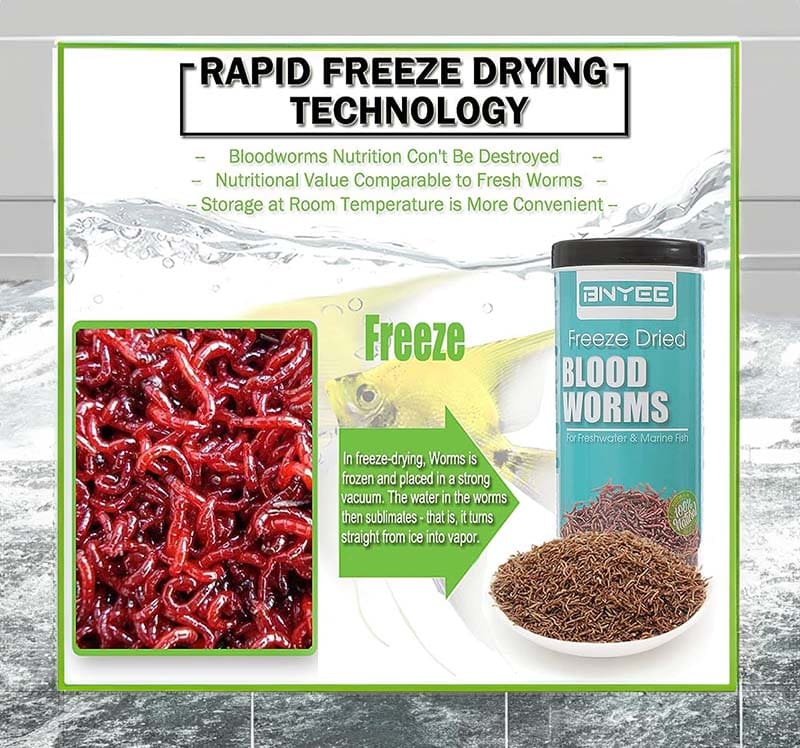
Most local pet stores stock frozen bloodworms. They’re typically presented in two formats: foil-sealed individual cubes or breakable frozen slabs. If you’re in the U.S., you might want to lean towards the Hikari brand. Known for its superior quality, Hikari ensures that the bloodworms are of premium standard and are easy to handle during feeding.
Keep in mind, a whole cube is rather generous for one meal. Thaw out a cube in a small containerand use a pipette or tweezers to serve a few bloodworms to your betta.
While your Betta might seem perfectly content gorging on bloodworms day in and day out, it’s essential to introduce variety. Just as we benefit from a balanced diet, so do our finned friends. Regularly rotating between two to three different food sources ensures they receive all the vital nutrients for a healthy life.
- Mimics Betta’s natural diet
- Available in premium quality (e.g., Hikari)
- Easy to handle during feeding
- Requires thawing before feeding
- Limited nutritional variety
- Should be part of a varied diet
#2 Live Blackworms (Live Foods)
Live foods are often regarded as the gold standard for betta fish food options. They mirror what bettas would naturally munch on in the wild, offering not just nutritional value but also behavioral enrichment.
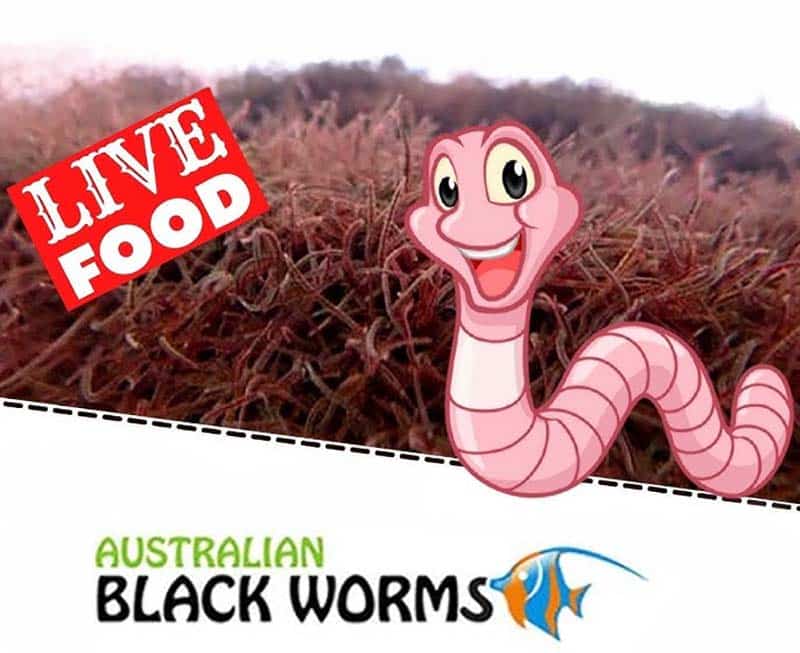
Among live foods, blackworms come highly recommended. Why? Being a true freshwater species, they don’t just die off in your aquarium. Instead, they burrow into the substrate. This behavior makes them perfect little playmates for your betta, turning mealtime into a fun hunting game. It’s not just about feeding; it’s also about stimulation and keeping your betta engaged.
However, as wonderful as live blackworms are, there are a couple of things to keep in mind. They might not be readily available at every local fish store and there’s a slight risk of them introducing parasites into your tank.
Yet, the benefits generally outweigh these concerns. Blackworms are rich in nutrients and provide ample mental stimulation for bettas. If you decide to introduce them to your aquarium, be discerning. Ensure you’re sourcing the worms from a trusted fish store. The best ones keep their blackworms refrigerated and in clear, fresh, odorless water.
- Natural and engaging for Betta
- Provides mental stimulation
- Nutrient-rich for Betta
- May not be readily available
- Slight risk of introducing parasites to the tank
#3 Betta Food Pellets
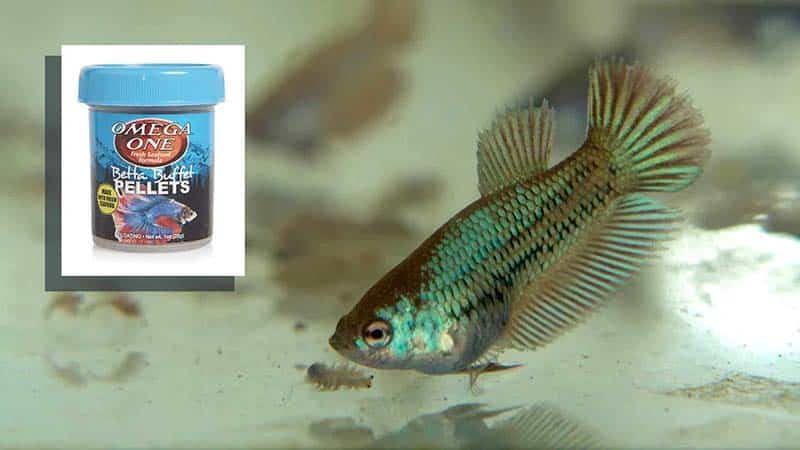
While pellets might not have the authentic appearance of natural food, they pack a punch in terms of nutrition. They’re crafted to contain the essential nutrients your betta fish requires, ensuring that they get a well-rounded meal in just a bite or two.
Unlike some food options, Betta food pellets don’t dissolve rapidly in water. This means less waste and a cleaner tank.Another advantage is that Betta fish are surface feeders due to their upturned mouths. Conveniently, most pellets float, aligning with the betta’s natural feeding habits.
- Convenient and nutrient-rich
- Minimal waste in the tank
- Floats, aligning with Betta’s feeding habits
- May not mimic natural diet as closely
- Limited variety in texture and shape
#4 Freeze Dried Betta Food
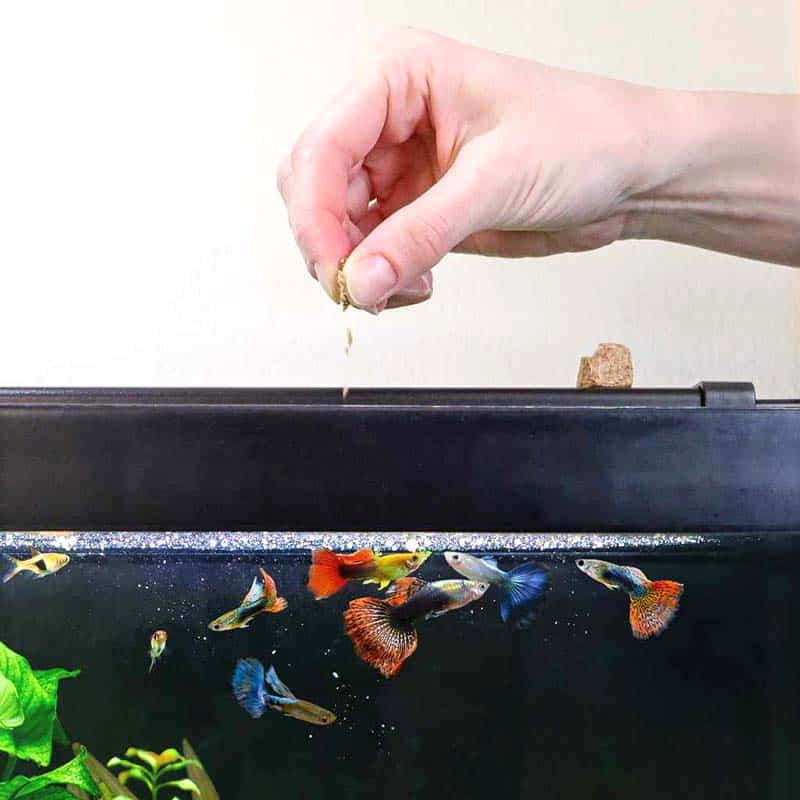
Freeze drying is a special preservation technique that removes moisture from foods, making them lightweight and dry, but importantly, retaining much of their original nutrients and taste. This is why freeze-dried bloodworms and brine shrimp have become popular choices for betta enthusiasts as an alternative to frozen foods.
One of the main advantages of freeze-dried foods is the sheer convenience. You don’t need to store them in a freezer, and they’re always ready to use. When introduced to the tank, these foods tend to float at the water’s surface, aligning with the betta’s natural feeding habits. This makes it easy for betta owners to portion out the right amount for each feeding session. And if your betta doesn’t finish everything? The dry nature of freeze-dried foods means they can be effortlessly removed from the tank, ensuring the environment stays clean.
- Convenient and no need for freezing
- Floats and easy to portion out
- Limited nutritional variety
- Can become messy if not eaten entirely
#5 Fluval Bug Bites Tropical Formula
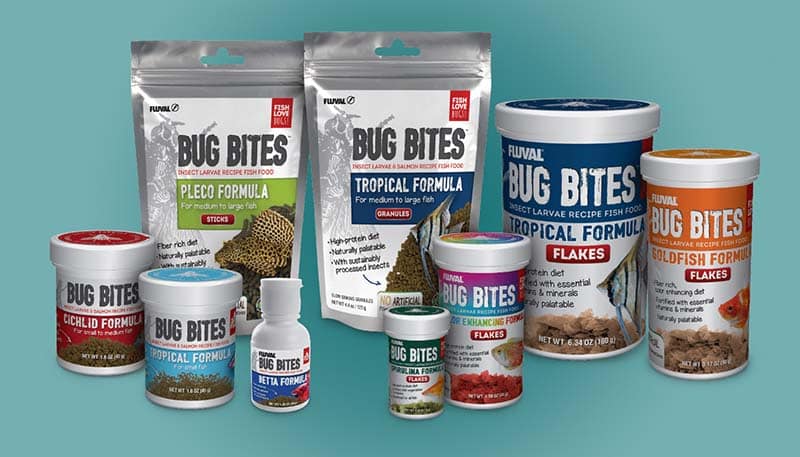
Fluval Bug Bites Tropical Formula introduces a unique approach to betta fish feeding with its nano pellet design. The primary ingredient here is black soldier fly larvae, a deliberate choice aimed at closely mirroring a betta fish’s natural insectivore tendencies.
The benefits of this food source don’t stop at just mirroring their wild diet. It’s rich in high-quality protein, bolstered with essential vitamins and minerals to promote the optimal health of your betta.
One thing to note about this product is its slow sinking nature. While this characteristic might mean that some betta fish might be initially hesitant to chase after it, it can be a boon if you have a community tank. Fish like tetras and corydoras are likely to appreciate these granules, ensuring no food goes to waste and every member of your aquatic family gets a share of the nutritious meal.
- Mimics Betta’s natural diet
- High-quality protein and essential nutrients
- Suitable for community tanks
- Sinks slowly, may not be ideal for all Betta fish
- May require adaptation for some Betta fish
Betta Fry Food
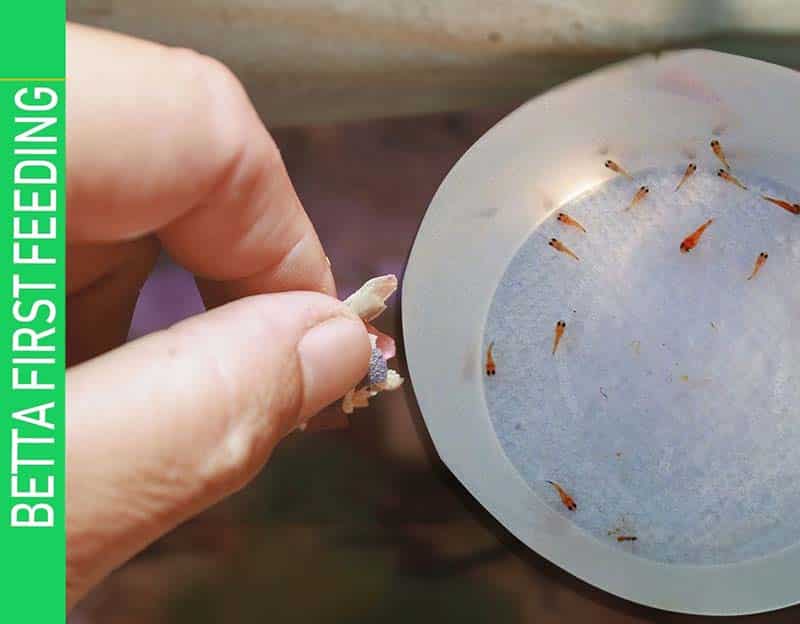
Betta fry, right from their earliest days, show a natural predilection towards chasing and consuming anything in motion that’s smaller than them. However, their feeding preferences don’t quite align with dry options such as flakes or powders. Instead, their inclination leans heavily towards live foods.
For the growing fry, a diverse menu can include Infusoria, minute free-living nematodes like Vinegar Eels, Microworms, Banana Worms, and Walter Worms. Other nutritious options to consider are baby Brine Shrimp, Daphnia, Fairy Shrimp, and Grindal Worms. These live foods mimic their natural diet, ensuring your betta fry receive the best start in their aquatic life.
What Can Betta Fish Eat Of Human Food
Have you ever noticed your Betta looking at you, wagging its tail like a little puppy while you’re enjoying your meal? It’s tempting to spoil them with bits from our plates. While it’s fun to treat Betta fish occasionally with human foods like boiled peas, leafy greens, cucumber, sweet corn, and non-citrus fruits like strawberries or melon, they’re not staples in a betta’s natural diet. Overfeeding Betta with our treats is not advisable.
#1 Boiled Peas
Betta fish can occasionally enjoy the simple pleasure of boiled peas, but there’s a catch. Always remove the shell before offering it to your betta. The skin can be tough for them to digest. Interestingly, not only are these peas a treat, but feeding a betta a couple can assist with digestion troubles they might be experiencing.
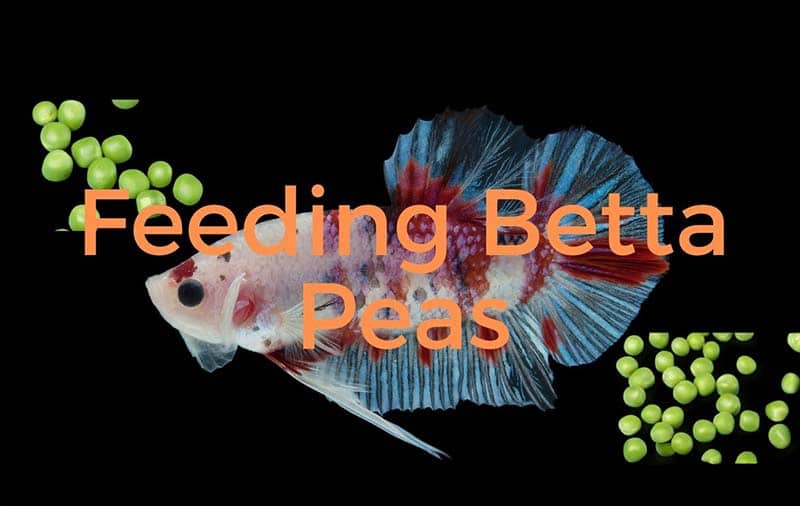
#2 Cucumber & Lettuce
Both cucumber and lettuce can occasionally grace your betta’s menu as delightful treats. However, moderation is the keyword. When giving these, ensure they’re chopped into tiny, manageable bits for your fish. While they might appreciate these green additions now and then, it’s essential to remember that lettuce, in particular, shouldn’t become a regular feature in their diet.
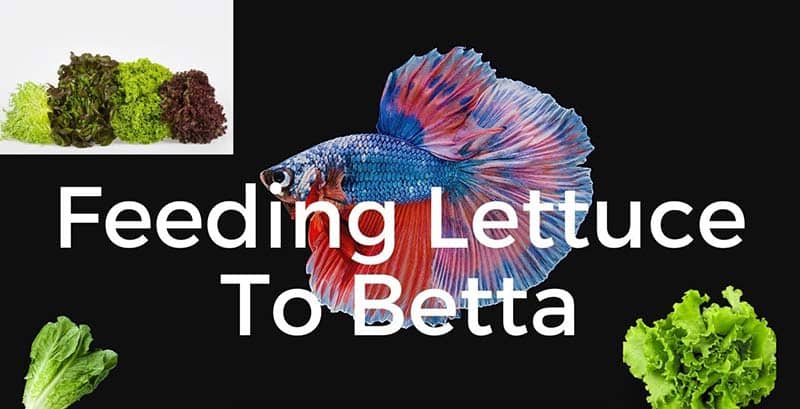
#3 Fruits
Bettas, much to some owners’ surprise, have quite the sweet tooth! Fruits like strawberries, apples, pear, mango, melon, and their favorite, cantaloupe, can serve as occasional treats. When offering these fruity delights, present them in tiny portions, ensuring they’re manageable for your betta.
However, not all fruits are betta-approved. Steer clear of citrus fruits. Their acidic nature isn’t just problematic for your betta’s digestion but also impacts the tank’s pH balance, turning the water acidic.
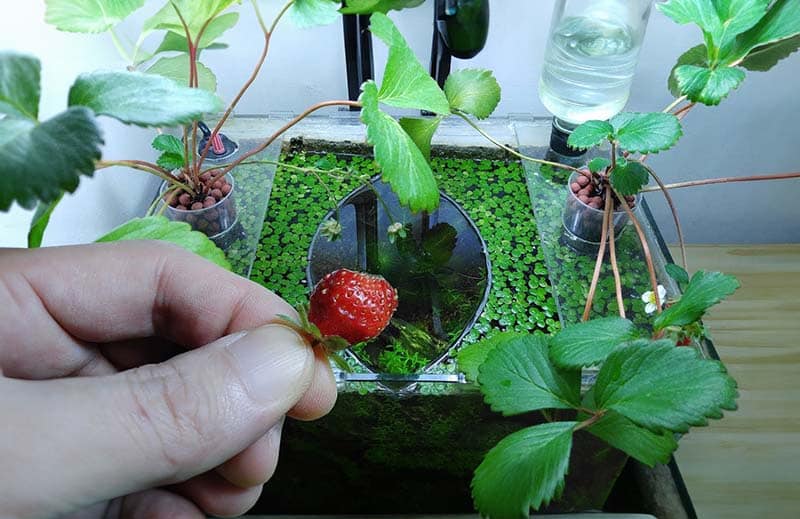
#4 Seafood For Betta
Bettas have a natural penchant for some gourmet treats from the sea! Fresh fish pieces and select seafoods, like tiny bits of shrimp, oysters, or scallops, can be exciting additions to their mealtime.
The benefit of such treats is that they’re rich in animal proteins, aligning with a betta’s dietary needs. This means that, every now and then, you could swap out regular fish food for these aquatic delights. However, when serving these, always ensure they’re unseasoned, keeping your betta’s health and well-being in mind.
#5 Chicken
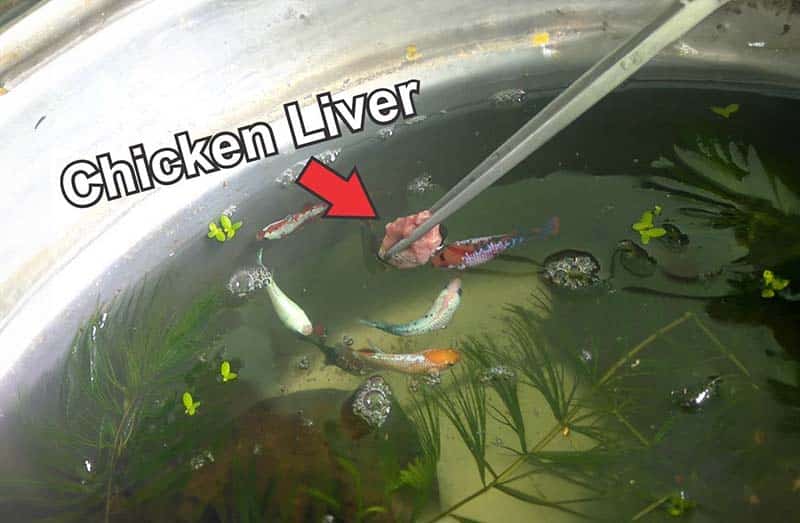
While it might seem unconventional, bettas can indeed nibble on meats like chicken, beef, or pork, but only in very minute amounts. Some aquatic enthusiasts may frown upon this practice, deeming it unnatural for a water-based creature to consume land meats. However, while it’s not their natural diet, it isn’t intrinsically harmful.
Should you choose to offer these meats, it’s essential to boil them thoroughly, ensuring they are devoid of any spices or seasonings. Remember, even though bettas are carnivorous, land meats should remain an infrequent treat rather than a regular component of their meals.
What To Avoid Food Bettas?
You might think as a tropical fish, betta fish can eat tropical fish food. In fact, they cannot. So it’s essential to avoid feeding your betta flakes designed for goldfish or other tropical species. Bettas possess uniquely short digestive systems, making them ill-equipped to handle fillers like corn and wheat. Unfortunately, many pellet and flake foods contain these fillers, which can result in issues like bloating and constipation for your betta. These fillers offer no nutritional value and mostly exit as waste.
And as we mentioned above, citrus fruits are not for bettas. Always make informed food choices for your aquatic friend to ensure a happy, healthy life.
Conclusion
Suggestions from National Park Aquarium – As caretakers of betta fish, it’s our duty to ensure they receive a balanced diet for their overall well-being. There are misconceptions about live foods leading to bloating and constipation. While this can occur, it’s usually due to a fiber-deficient diet or overfeeding.
It’s important to note that betta fish might continue eating even when they’re not hungry. This is because in the wild, they’re uncertain about when they’ll get their next meal, so they tend to eat whenever food is available.
The most nutritious food for betta fish, in descending order, are live food, frozen food, freeze-dried food, pellets, and flakes. Offering a mix of these foods will ensure your betta fish gets the diverse nutrients it needs to flourish.




